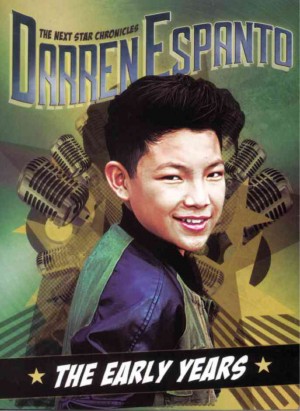Darren Espanto and Bailey May–win some, lose some
WHAT makes an album tick—and click? A hit-seeking recording artist’s job is never easy, because there are no fail-safe methods of creating chart-toppers.
Some singers rely on genuine singing ability to entertain their followers (like Lani Misalucha or Darren Espanto), while the less vocally gifted performers bank heavily on guts (Toni and Alex Gonzaga), a well-produced selection of songs (Daniel Padilla), or self-deprecating bravado (Anne Curtis) to make up for their less-than-stellar musicality.
The results aren’t easy to predict, however. To make our point, let’s hopscotch from one recording to another:
It takes a while to warm up to Darren Espanto’s second album, “The Next Star Chronicles: The Early Years,” because its sound is occasionally weighed down by curiously canny arrangements and instrumentation.
But the collection and its selections grow on you because they don’t just reinvigorate old faves like The Jacksons’ 1978 hit, “Shake Your Body (Down to the Ground),” and Michael Jackson’s “Wanna Be Starting Something,” they also showcase Darren’s knack for note-scaling, especially in his updated versions of Rihanna’s “Diamonds” and Bruno Mars’ “Locked Out of Heaven.”
If you prefer to take a stroll down memory lane, Darren’s exceptionally rendered revival of Paul Anka’s “Puppy Love” won’t disappoint.
Article continues after this advertisementThe song was originally written by Anka in 1960 for popular Mouseketeer Annette Funicello, whom he was dating at the time.
Article continues after this advertisementThe tune’s latest cover doesn’t just show off Darren’s pristine pipes and high notes; its lyrics also vivify a young person’s endearing naïveté—and penchant for romantic recklessness!
Darren can sing circles around “Pinoy Big Brother’s” latest exciting find, Bailey May—who bites off more than he can chew in his self-titled debut recording, “Bailey.”
The album’s cover and art design may look as attractive as the 13-year-old looker himself, but Bailey’s performance in general feels rushed and undercooked. It’s a classic case of selling the sizzle more than the steak.
Bailey is served well by competent songwriters who deliver radio-ready melodies (Trina Belamide’s “Gotta Win,” Jamie Rivera’s “Gusto Kita”). Unfortunately, the aforementioned cuts require more than just charm from their enthusiastic interpreter.
Bailey does best in the upbeat “Boom Goes My Heart”—which is ironic, because the track digitally alters his voice!
Moreover, the album could have benefitted from Bailey’s ably rendered reworking of “Magmahal Muli,” sung with Ylona Garcia.
Don’t get us wrong, we don’t mind listening to nonsingers who are gutsy enough to wax albums, even if they can hardly carry a tune—after all, that is what the Autotune technology is for.
As long as their recording companies can hire prolific composers like Jungee Marcelo and Vehnee Saturno to concoct catchy singles for them and “smoothen” their vocal missteps and other perceived inadequacies, we don’t have any problem with that.
For example, Daniel Padilla always chooses songs that suit his range and singing style (“Nasa ’Yo Na ang Lahat” and his Motown covers), but it’s hard to conceal his limitations when he’s tasked to sing and scale melodies with complex bends and curls, like Rey Valera’s pert and peppy “Kumusta Ka” and The Lettermen and Shaun Cassidy’s “Morning Girl.”
Despite their interpreters’ perceived lack of technique, vocal heft and stability, we still enjoyed listening to Enchong Dee’s “Chinito Problems,” Nadine Lustre’s “Paliguy-ligoy,” Kathryn Bernardo’s “You Don’t Know Me,” Alden Richards’ “Wish I May” and Kim Chiu’s winsome “Mr. Right.”
Of course, listening to these actors-turned-singers perform live is a different matter altogether!

